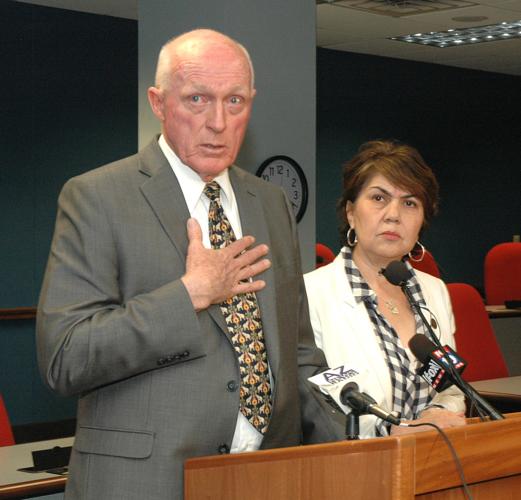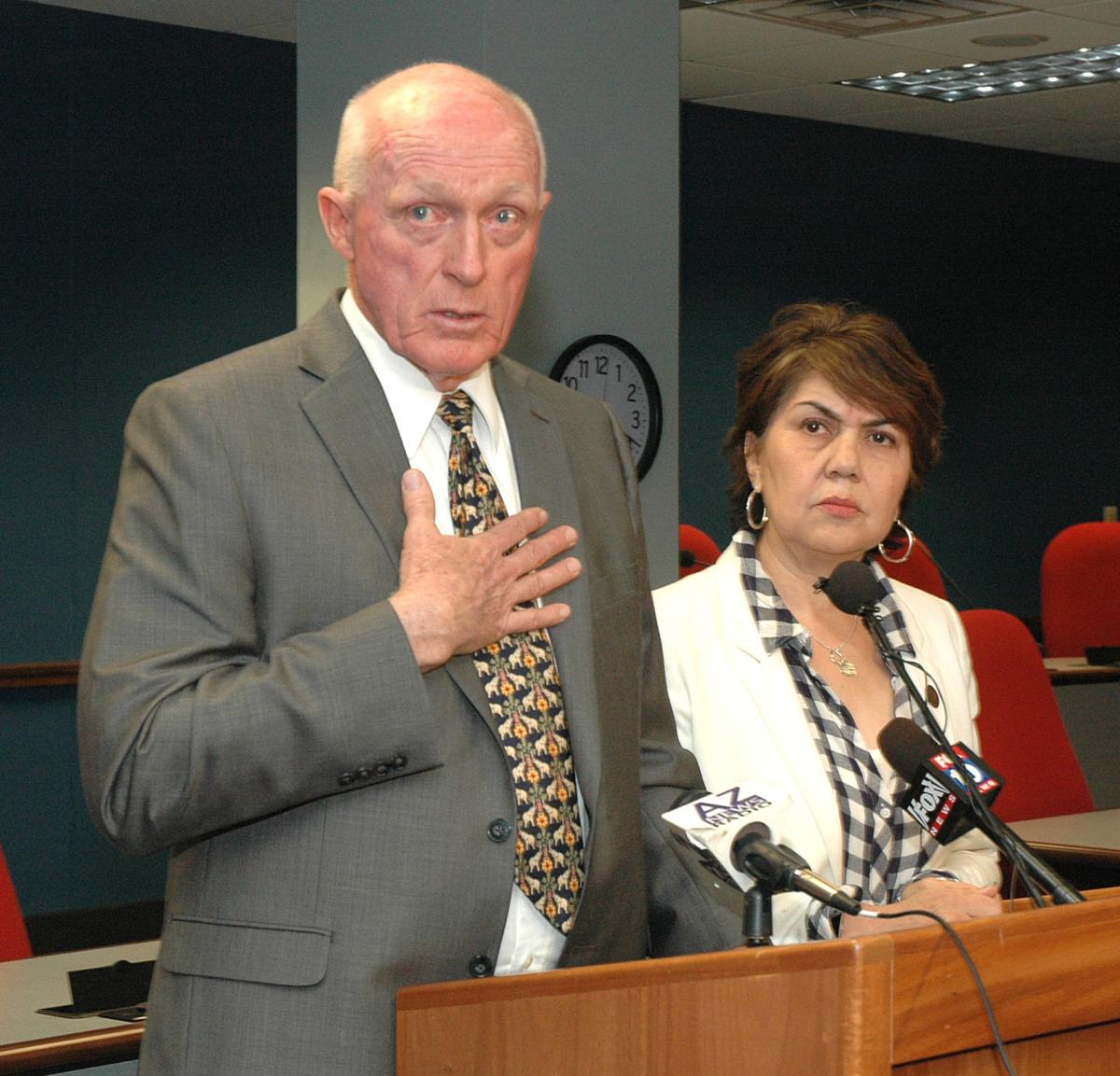PHOENIX — David Stringer quit the Legislature Wednesday after the House speaker told him he had the police report of Stringer’s 1983 arrest accusing him of having sex with two boys.
One of the boys was 13 and the other was listed as a child younger than 15 who was developmentally disabled, the police report said.
Now, House Speaker Rusty Bowers and House Minority Leader Charlene Fernandez are weighing whether there should be background checks and fingerprinting of current and future lawmakers.
Stringer, a Prescott Republican legislator, was set to go to court Wednesday in a bid to block the House Ethics Committee from demanding that he turn over documents. Those documents were from the District of Columbia Bar Association, which had looked into his 1983 arrest in Maryland on sex charges including “perverted practice.” The bar also reviewed a 1984 court decision to place Stringer on probation for five years and require him to seek admission to the Sex and Gender Clinic at Johns Hopkins Hospital.
But that was before a private investigator hired by the Ethics Committee got the report from the Baltimore Police Department.
“Upon reading the report I was sickened,” Bowers said.
The speaker said he informed Stringer on Wednesday, about an hour before the hearing, that he had the police report.
“I asked for his resignation and that he would fill it out immediately, and informed him it would be best if he left the property, also immediately, which he did,” Bowers said.
The 1983 police report alleged incidents starting a year earlier. It said Stringer, who would have been 35 or 36 at the time, walked up to a boy and a friend at a park “and asked if they wanted to go to his house and have sex.” The report said that resulted in a trip to Stringer’s apartment where sex acts occurred.
“After this the boys were given $10 apiece and they left,” the report stated. It also said one boy had been back “at least 10 additional times,” the last incident in July 1983.
The private investigator who came up with the police report also reported that one of the victims went on to become a sex offender himself, “which is often the case with victims of sexual abuse.’’
A follow-up police report in January 1984 said Stringer was placed on supervised probation and directed to seek admission to the clinic.
But Stringer’s attorney, Carmen Chenal, insisted that what is in the police report “never happened.”
She also said that, despite what is in the police report and court records, Stringer never was required to seek treatment at the clinic.
She also said Stringer was never convicted of any crime, agreeing to probation ahead of any court judgment.
Bowers acknowledged the incident occurred decades ago. And he said he has no corroborated reports of any incidents involving Stringer since then.
But the speaker said he stands by his decision to ask Stringer to leave — and immediately.
“I am aware, having grandchildren and children, and all of you in the public with our families and loved ones, that this is very disturbing, and especially to us with the trust,” he said. “And I want to maintain that trust and the integrity of this institution.”
Bowers said it goes beyond that.
“What is most important to me is that the people who come into this House are safe, that the people who work in this House are safe,” he said.
Fernandez was more specific.
“We need to put together some new protocols and how we do business here and maybe look at what kind of people run for office,” she said.
Pushed as to what she has in mind, Fernandez said that, at the very least, a politician’s supporters should be looking into “who you are and where you came from.” That includes whether there is any criminal record, she said.
“Maybe we need to be fingerprinted,” she said.
Bowers said he is “open to those discussions. What do we need to do to assure that we can move forward and people can have confidence, as much as it’s possible in a political arena, in the membership of this House?”
He declined to say what Stringer told him when he asked for his resignation and whether he said he was innocent.
Stringer did not return messages seeking comment.
Chenal said there is less to the incident than the police report would suggest.
She read from what she said was part of the findings by the D.C. Bar, which did its own investigation to determine whether to strip Stringer of his ability to practice law.
“In the facts and circumstances of this case, there was no involvement of moral turpitude such as would adversely affect your fitness to practice law,” Chenal read from the letter.
The same letter, she said, noted that there was no conviction, with the trial court “entering probation before judgment” and agreeing to expunge the records after the probation period.
“I do know that if he had really done something with the boys, he would have been convicted,” Chenal said. “He would have gone to prison.”
None of that convinced Bowers, who called the record showing Stringer being placed on probation “scandalous.”
“How this could happen is beyond my imagination, how a justice system could fail in this way,” he said, quickly adding, “in my view.”
There is nothing in the police report to show whether prosecutors were able to get the cooperation of either alleged victim.
The documents released Friday by the Ethics Committee also reveal that the Yavapai County Bar Association refused to renew Stringer’s membership in December following published reports of racially charged remarks and comments about the burdens of immigration, particularly from non-European countries, people who “don’t melt in, they don’t blend in, they always look different.”
“Your recent comments in public regarding race, diversity, and the burdens of minorities on Arizona do not comport with this high level of dignity and respect we expect from our members or other Arizona attorneys,” wrote Brian Shaw, president of the association.
Stringer, in a letter to Shaw, accused the association of “imposing a politically correct speech code.”
Chenal said the decision by the lawyers’ group was “very, very political” but declined to provide other details.







